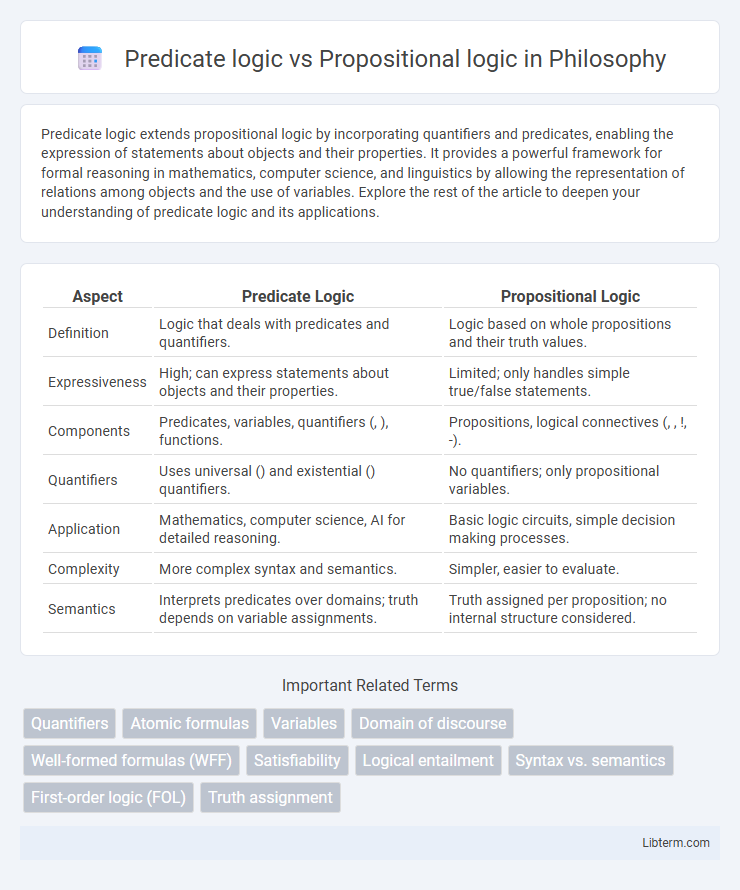Predicate logic extends propositional logic by incorporating quantifiers and predicates, enabling the expression of statements about objects and their properties. It provides a powerful framework for formal reasoning in mathematics, computer science, and linguistics by allowing the representation of relations among objects and the use of variables. Explore the rest of the article to deepen your understanding of predicate logic and its applications.
Table of Comparison
| Aspect | Predicate Logic | Propositional Logic |
|---|---|---|
| Definition | Logic that deals with predicates and quantifiers. | Logic based on whole propositions and their truth values. |
| Expressiveness | High; can express statements about objects and their properties. | Limited; only handles simple true/false statements. |
| Components | Predicates, variables, quantifiers (, ), functions. | Propositions, logical connectives (, , !, -). |
| Quantifiers | Uses universal () and existential () quantifiers. | No quantifiers; only propositional variables. |
| Application | Mathematics, computer science, AI for detailed reasoning. | Basic logic circuits, simple decision making processes. |
| Complexity | More complex syntax and semantics. | Simpler, easier to evaluate. |
| Semantics | Interprets predicates over domains; truth depends on variable assignments. | Truth assigned per proposition; no internal structure considered. |
Introduction to Logic Systems
Predicate logic extends propositional logic by incorporating quantifiers and predicates, allowing expressions about objects and their properties rather than simple true/false statements. Propositional logic operates on atomic propositions combined with logical connectives, making it foundational for basic logical reasoning but limited in expressiveness. Predicate logic's enhanced structure supports detailed modeling of statements in mathematical proofs, computer science, and artificial intelligence, providing a richer framework for formal logic systems.
Defining Propositional Logic
Propositional logic is a formal system in mathematical logic that deals with propositions as atomic units and their combinations using logical connectives such as AND, OR, NOT, and IMPLIES. It does not analyze the internal structure of propositions or quantify over variables, making it less expressive than predicate logic, which includes quantifiers and predicates to represent relationships and properties of objects. Propositional logic serves as the foundation for classical logic, offering a simplified framework primarily used in digital circuit design, boolean algebra, and basic automated reasoning.
Understanding Predicate Logic
Predicate logic extends propositional logic by incorporating quantifiers and predicates, enabling the representation of relationships between objects and the properties they hold. It allows for more expressive statements, such as "All humans are mortal," using universal quantification and variables, which propositional logic cannot capture. Understanding predicate logic involves grasping its syntax involving predicates, terms, and quantifiers, as well as its semantic interpretation that assigns meaning to these components within a domain.
Key Differences Between Propositional and Predicate Logic
Propositional logic deals with simple, declarative propositions that are either true or false, without internal structure, while predicate logic extends this by incorporating predicates and quantifiers to express relationships and properties within objects. Predicate logic enables the use of variables and quantifiers such as "forall" () and "exists" (), allowing for more precise and expressive statements about individual elements in a domain. The key difference lies in propositional logic's limitation to whole statements versus predicate logic's ability to analyze internal components and express generalizations about elements.
Expressiveness and Representation Power
Predicate logic offers greater expressiveness and representation power than propositional logic by incorporating quantifiers and predicates that can describe relationships among objects. While propositional logic deals with simple true or false statements without internal structure, predicate logic can represent complex statements involving variables and properties. This enhanced capability allows predicate logic to model real-world scenarios more accurately and handle intricate logical inferences that propositional logic cannot.
Syntax and Structure Comparison
Predicate logic extends propositional logic by incorporating quantifiers and predicates, allowing expressions about objects and their properties rather than mere truth values. The syntax of propositional logic consists of propositional variables (P, Q, R), logical connectives (!, , , -, -), and parentheses, forming atomic or compound propositions without internal structure. In contrast, predicate logic syntax includes predicates with arguments, variables, quantifiers (, ), and allows for nested expressions, enabling richer structural representation of relationships and functions within statements.
Common Applications in Computer Science
Predicate logic, with its use of quantifiers and variables, is fundamental in artificial intelligence for knowledge representation and automated theorem proving. Propositional logic, being simpler and involving only whole statements without internal structure, is commonly applied in digital circuit design and basic program verification. Both logics serve crucial roles in model checking and formal methods to ensure software correctness and system reliability.
Advantages and Limitations
Predicate logic offers greater expressive power than propositional logic by allowing quantification over variables, enabling the representation of relationships and properties within a domain. Propositional logic is simpler and computationally less complex, making it suitable for problems where statements are true or false without internal structure. However, propositional logic cannot capture the nuances of predicates and quantifiers, while predicate logic's increased expressiveness comes with higher computational cost and complexity in automated reasoning.
Real-World Examples and Use Cases
Predicate logic extends propositional logic by incorporating quantifiers and predicates, allowing for more precise representation of real-world scenarios such as database queries and natural language processing. Propositional logic is typically used in simple circuit design and basic program verification where statements are unequivocally true or false. Predicate logic supports complex reasoning in artificial intelligence applications like knowledge representation and automated theorem proving, enabling nuanced analysis beyond propositional logic's capabilities.
Conclusion: Choosing the Right Logic System
Predicate logic offers greater expressiveness by handling quantifiers and relationships between variables, making it ideal for complex reasoning tasks. Propositional logic, with its simpler structure of true or false variables, suits scenarios requiring straightforward decision-making or digital circuit design. Selecting the right logic system depends on the problem's complexity, with predicate logic preferred for detailed analysis and propositional logic for efficiency and clarity in basic logical evaluations.
Predicate logic Infographic

 libterm.com
libterm.com